Graduate School of Medical Science Major of Medicine / Faculty of Medicine, School of Medicine
Department of Basic Sciences
Department of Anatomy and Structural Science
"Macroscopic anatomy" and "embryology" of the human are taught to 125 medical students during their first and second year. For the postgraduate student course, morphological and electrophysiological training program has been structured. The program is designed to provide the students with current concepts and techniques of histology and neurophysiology.
The research activities of the department have been focused on the following projects:
1. Anatomical and physiological studies of the human motor system, i.e., joint, muscle, spinal reflex arc, motion, and force.
2. Morphological and biochemical studies of the vertebrate ectopic endocrine system.
Department of Anatomy and Cell Biology
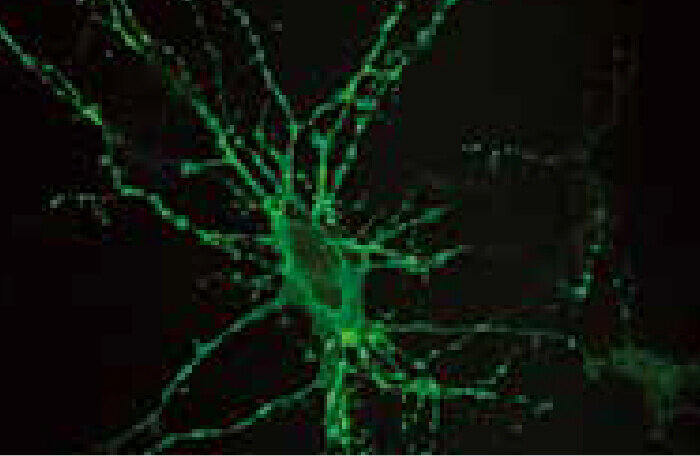
As the basics of medicine, medical students learn the structure and function of the organs of human body at the cell and tissue levels. For this purpose, students examine tissue specimens under a microscope and conduct medical drawings. Students also learn how the central nervous system such as brain and spinal cord is constructed to integrate various parts of the human body. In addition to the medical education. we are engaged in the cutting-edge research based on a morphological examination. We focus on the "visualization of life phenomenon." When and where are the major components of cells, such as nucleic acids, proteins, and lipids, synthesized in our tissues and cells? We made full use of advanced technologies to approach this topic.
Department of Physiology [HP]
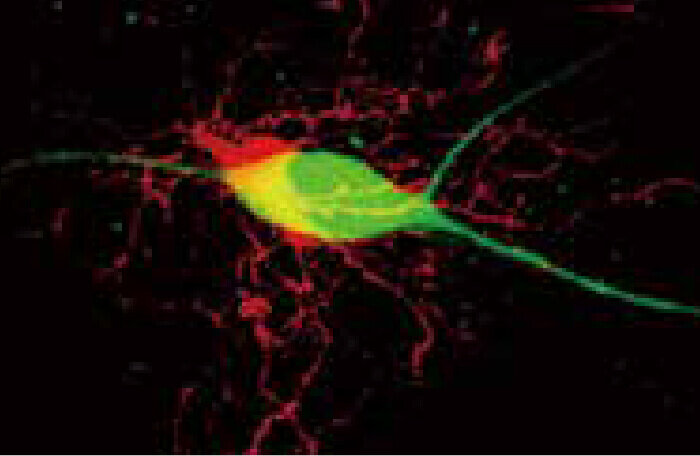
Our studies are focusing on the higher brain functions with the goal of deciphering the molecular mechanisms of synaptic plasticity in central nervous system, which is assumed to be a cellular basis of learning and memory. Our research also is actively investigating the function of glial cells, in terms of the interaction between neurons and glial cells. To study the idea we conceive, various neurophysiological recording systems combined with molecular biological and morphological approaches as well as systems for analyzing behaviors of rodents are being used. We also are planning to expand our study into translational researches such as the analysis of pathophysiological conditions and clinical pharmacology in the future. We are greatly expecting that students who are interested in those research areas participate in our research.
Department of Pharmacology [HP]
Pharmacology is the study of the interaction between drugs and living organisms. We teach how drugs exert their effects (pharmacodynamics) and how our body deals with drugs (pharmacokinetics). As to the research, we conduct the basic experiments on abnormal excitability of the heart and on differentiation and regeneration of the neuronal cells by neurotrophic factors. Sudden cardiac death is known to be largely due to lethal arrhythmia and more than half of heart failure death is believed to be also due to lethal arrhythmia. Therefore, we think it is important to study the mechanisms of cardiac abnormal excitability in terms of both basic and clinical aspects. In addition, neurodegenerative diseases such as Alzheimer disease are one of the large social problems in the current aging society. Since neurotrophic factors promote survival, differentiation and regeneration of the neuronal cells, we study the mechanisms of effects of those factors hoping that it will help to establish new therapy for neurodegenerative diseases.
Department of Infectious Diseases
Department of Infectious Diseases has been investigating the influenza C virus by molecular biology and epidemiology to understand the mechanism of influenza C virus replication and influenza C epidemic for more than 30 years. We recently established the reverse genetics method by which the recombinant influenza C virus possessing expected mutations can be produced and the replication mechanism of the virus has been analyzed. Department of Infectious Diseases plays a role in lecturing the secondgrade medical students on virology, bacteriology, parasitology and mycology and the third-grade medical students on etiology of infectious diseases. The main theme of the research projects of the graduate students is pathogenic viruses, especially influenza C virus, which cause respiratory infectious diseases.
Department of Molecular Cancer Science
The Department of Molecular Cancer Science provides education and conducts research on basic oncology. Lectures entitled "Basic Oncology" and "Clinical Oncology" are given, in which undergraduate students learn the genetic/molecular biology behlnd carcinogenesis and cancer therapies, respectively. Our current research interests are focused on the molecular analysis of cancer stem cells (CSCs), which are now deemed the main culprit of tumor recurrence, as well as on the development of therapeutic approaches to target CSCs to enable curative treatment of cancer through prevention of recurrence. Our lab members love to think differently and are always willing to take advantage of unexpected and even unwanted experimental results. Thus, we are proud of being unique and different from other labs.
Department of Immunology [HP]
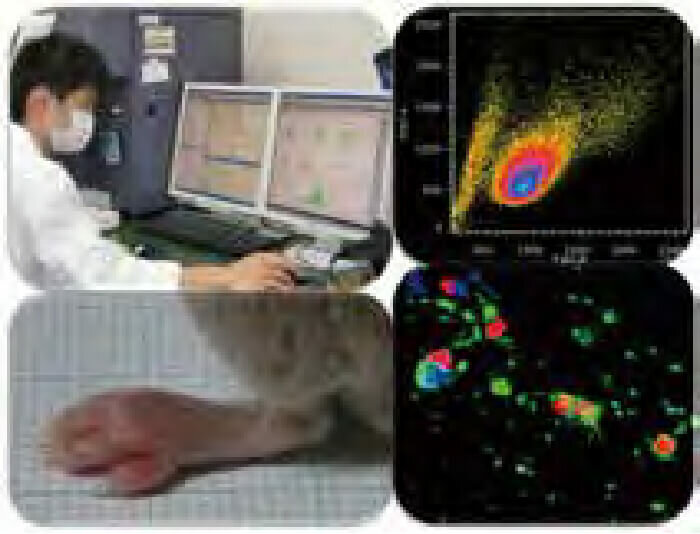
The immune system takes very important roles that protect human body against illness and infection caused by microbes and cancer. In late years the immune structure was elucidated drastically, but there are still many problems to be solved, for example allergic diseases, autoimmune diseases and so on. We are mainly studying on the humoral factors, so-called cytokines, which control our immune system. Our goal is elucidation of pathogenesis of the immune related diseases and development of therapy by understanding the complicated immune structure at individual level from a molecular level through our cytokine study.
Department of Forensic Medicine [HP]
Forensic medicine, also called legal medicine, deals with the interaction of medical science with the law. Progress in forensic medicine has contributed to the protection of
individual fundamental human rights, the maintenance of public security, and public health administration. In our department, we engage in various forms of practical work
and related professional education for undergraduate and postgraduate students.
Practical work:
(1) Autopsy and toxicological analysis in cases of unnatural death to determine the cause of death, the mechanism of death, and postmortem interval.
(2) Examinations to determine species or human personal identification using DNA typing, genetic markers and morphological characteristics to determine the identity of
unidentified cadavers, or abandoned bone and nail material. The results obtained contribute to genetic or anthropological studies.
Department of Clinical Sciences
Department of Internal Medicine I (Division of Cardiology, Pulmonology, and Nephrology)
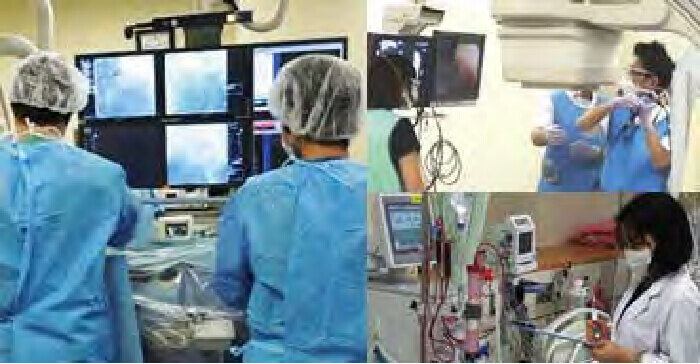
The activities of the Department of Cardiology, Pulmonology, and Nephrology cover a wide range of internal medicine, mainly cardiology, pulmonology, nephrology and rheumatology. We develop our capacity for clinical activity, medical education, and scientific research, to be an outstanding expert in our field, through intensive trainings. In parallel we broaden our horizons as a general physician, through collaborative activities including joint clinical and research conferences.
Department of Internal Medicine II
Division of Gastroenterology [HP]
In this course, education, clinical care and research are carried out in the field of gastroenterology (liver, digestive tract, biliary system and pancreas). The emphasis is on enriching management protocols and actively adopting endoscopic treatment, local therapy for liver cancer, novel strategies for inflammatory bowel disease and so on. Furthermore, the development of innovative therapeutic methods such as tailor-made treatments and regenerative medicine has been attempted. Students and junior residents are guided so that they can receive practical training in a positive manner. For the senior residents, emphasis is placed not only on teachlng expertise and practical knowledge, skills and so on related to gastroenterology but also on cultivating physicians capable of providing comprehensive care for sick patients. For these purposes, we have improved the training system and set concrete training goals, allowing individual trainee physicians to receive guidance toward the achievement of their goals. Still more, to facilitate acquisition of high-level expertise, knowledge and skills, trainees are guided as to the analysis and assessment of various diseases and conditions on the basis of the latest available evidence. The diverse findings obtained have been actively disseminated within Japan as well as internationally.
Division of Clinical Oncology
The Department of Clinical Oncology is dedicated to providing chemotherapy to cancer patients, and developing more effective treatments, since established in 2007. Increasing cancer cure rates, or bringing a better outcome in cancer care is a challenging issue we face in an aging society. We pursue this, mainly by systemic chemotherapy, especially in locally advanced, or recurrent cancers. Unfortunately, not a few patients get initially diagnosed at an advanced stage of cancer. Chemotherapy is becoming to play an important role in the multidisciplinary treatment options, in collaboration with surgery and radiotherapy, by the recent emergence of targeted therapies. Clinical oncologists need to be endowed with the skill of medical oncology, and coordinating or managing treatment among available multidisciplinary treatment options; we provide this through our clinical practice. Further, our department is obliged to train young oncologists to become a clinical oncologist as well.
Department of Internal Medicine III
Division of Neurology and Clinical Neuroscience
The Division of Neurology and Clinical Neuroscience is an interdisciplinary department with common interests in the human nervous system, in both health and disease. The mission of the Division is to understand the human nervous system and to improve the lives of patients with neurological disease. The Neurology Clinic at the Yamagata University Hospital provides a full range of neurological services including the evaluation, treatment and care of neurological disorders. Clinical and basic neuroscience research activities are ongoing in subspecialty areas including the Yamagata cohort study of elderly people, visual cognition in dementias, idiopathic normal pressure hydrocephalus, cerebrotendinous xanthomatosis and other hereditary neurological disorders. Molecular epidemiological, neuropsychological, neuroradiological and neurophysiological approaches are used in these studies. Trainee education is one of the primary focuses of the Division. Our clinical environment provides trainees with a broad range of experience to make them future leaders in neurology and neuroscience. We welcome doctors and researchers from different disciplines (e.g. neurology, psychiatry, psychology, etc.) to the Division, who will enhance patient care and impact neuroscience discovery.
Division of Endocrinology, Metabolism and Diabetology
In our field, we have been promoting Funagata-cohort study from 1979 and pushed forward a study to elucidate the mechanism about the onset and its health hazard of diabetes mellitus. This study develops as a molecular epidemiology study through 21st COE (Center of Excellent) and global COE program of Yamagata University and also has been tied to various kinds of study such as heredity statistics, molecular biology, and biochemistry and contributes to investigation about the pathogenic mechanism and cause of diabetes mellitus. However, though multiple genes are known to be associated with the onset of type II diabetes mellitus, SNP analysis consisting of GW AS was not able to completely prove how genetic factors were associated with every individual case. In order to solve these problems, we will develop these studies more in future.
Division of Hematology and Cell Therapy
Our department treats hematological disorders, especially hematological malignancy, leukemia, malignant lymphoma. Germfree management is necessary in many cases to carry out intensive chemotherapy, hematopoietic stem cells transplantation. In addition, our hospital is the only authorized facility of the bone marrow bank in the prefecture and carries out all unrelated hematopoietic stem cells transplantation in Yamagata We work on chemotherapy in outpatient setting positively to maintain patient's QOL. Development of new agents and modalities are important roles of this department too. We aim at the improvement of therapeutic efficacy by conducting many multicenter clinical trials and registration trails. In addition, in cooperation with core hospitals in the prefecture, we carry out high quality medical care.
Department of Psychiatry
In this department research, education and clinical practice on various psychiatric disorders are conducted. Our policies are, firstly, to take a balance between biological and psychological procedures, in other words, between drug therapy and psychotherapy. Always considering this balance, we seek the best treatment for each psychiatric disorder and each patient. Secondly, to try to respond to requests from the society and region. From this viewpoint, we lay emphasis on mood disorders such as depression, senile psychiatric disorders such as dementia, and child and adolescent psychiatric disorders such as developmental disorders. Needless to say, we also handle other common psychiatric disorders. Thirdly, to focus on clinical research and to feed back the results to clinical practice.
Department of Pediatrics [HP]
Although the declining birthrate is continuing in Japan, the patients with refractory diseases are not always decreasing. The quality level of medical provision for a recent pediatrician is getting rising. To answer such social requirements and to maintain childhood good health and growth, we are dedicating ourselves to clinical medical practices, studies and researches. Many children with various refractory diseases are referred to our hospitalf rom all area of Yamagata prefecture, and we offer integrated examininga nd state-of-the-artt reatment in accordancew ith proper speciality. Six highly educated groups are provided:h ematology/oncologyn, eonatology,e ndocrinology/metabolismc,a rdiology,n ephrology,a nd neurology.W e also offer a training program for the certified board of Japan pediatric society and for above each sub-specialityw ith continuingm edicale ducationp rogram. Our main basic research interest is a relationshipb etween particular gene changes and variable clinicalm anifestationsM. any disease-causingm utations were found,b ut the same mutation does not always result in the same clinicalm anifestation.W e are analyzingg enetic changes in the patients such as severe congenitaln eutropenia.c ongenitalc entral hypoventilations yndrome,i nfantile epileptic encephalopathy and refractory nephrotic syndrome. Our goal is to find a mechanism between heterogeneous clinical manifestations and a gene mutation. There are requests for a molecular diagnosis from many domestic facilities for the disease to which the study is precedent. To find a new better treatment for the rare refractory diseaseo f childhoodw, ell-designedc linicalt rials must be done.T hereforew e participatei n childhoodc ancer clinicalt rials those are constructed through Japan Children's Cancer Group. In addition to these, we ourselves lead such as a prescription study of medium chain fatty acid to an adult and children with citrin deficiency.
Department of Surgery I (Division of Gastroenterological, Breast and Thyroid, General Surgery)
Five major cancers in Japan are gastric cancer, cola-rectal cancer, hepatocellular carcinoma, breast cancer and lung cancer. Four of these five cancers are treated in our First Department of Surgery. Moreover, we are treating various cancers, such as esophagus, biliary duct, pancreas and thyroid cancers. Cholecystitis, inguinal hernia and acute appendicitis are common benign surgical diseases. Rapid diagnosis and appropriate surgery are done in our department every day. Less-invasive laparoscopic surgery is also performed for various diseases. Although pancreatic cancer is one of the poorest prognosis cancer, preoperative chemo-radiation therapy enable to operate for unresectable pancreatic cancer. Survivors more than 5-years are increasing due to post-operative chemotherapy in outpatient clinic. Intraductal papillary mucinous neoplasm (IPMN) becomes to have poor prognosis in accordance with progression. Professor Wataru Kimura is the member of "International consensus guidelines 2012 for the management of IPMN and MCN of the pancreas". Appropriate timing and surgical procedures are decided in our department. We contribute to reginal surgical treatment of Castro-intestinal, breast and thyroid disease. In addition, we are sending new clinical messages of surgery through medical papers and presentation at the congress. However young surgeons are decreasing recently, we hold conference every morning in order to grow up future surgeons and medical students. Otherwise, patients will not receive surgical treatment in the future.
Department of Surgery II (Division of Cardiovascular.Thoracic and Pediatric Surgery)
Our department contains three highly professionalized surgical fields, Cardiovascular, General Thoracic (Pulmonary) and Pediatric Surgery.Each field plays important role in the central part of hospital function of Yamagata University, Cardiac and pulmonary disease Care, Neonatal ICU and Perinatal Care Center. Around 770 surgical procedures are performed every year, including cardiovascular surgery (for congenital heart disease, coronary artery disease, valvular disease, thoracic aortic aneurysm, etc.), peripheral vascular surgery (abdominal aorta, etc.), lung cancer surgery (approx. 45% VATS), pyrothoracic surgery, neonatal surgery, pediatric cancer, etc., and the numbers are increasing every year. In the cardiology center and respiratory center, medical specialists and surgical specialists work together to deliver the highest levels of medical treatment. We also have a pediatric unit, and with the operation of the perinatal mother and child center, have a substantial system in place in the field of pediatric surgery also. In terms of education also, our aim is to foster future generations of surgeons and are working to make classrooms available.
Department of Neurosurgery
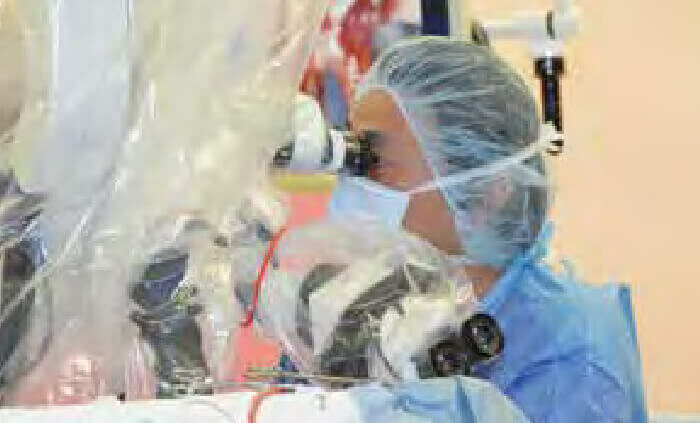
It is a motto that we are always considering the best way for medical treatment under the instruction of Professor Yukihiko Sonoda who took office in May /2015. In clinical field, we offer cutting-edge medical treatment, especially the multidisciplinary treatment of the brain tumor and treatment of a cerebrovascular disease, which uses high magnetic field intraoperative MRI and hybrid operating room. In the research field, the generating mechanism of the malignant brain tumor and development of treatment based on molecular biological research are the main theme. Furthermore, we research on the diagnosis using PET. On the other hand, we are also doing research on the cerebral blood flow and metabolism by using PET and the surgical treatment of ischemic cerebrovascular diseases such as moyamoya disease and a carotid stenosis, and a generating mechanism in the cerebrovascular disease. In the educational field, since there are various diseases in neurosurgery such as a tumor, apoplexy, head trauma, spine, epilepsy, function, and pediatric neurosurgery. We aim at making the expert of a national level and medical organization where the patient can be satisfied with of fields.
Department of Orthopaedic Surgery
In the era of super-aging society in Japan, disability of the musculoskeletal system, especially, that of bone and joint. leads to inferior and unfavorable activity of daily living and quality of life. We have noble missions to resolve those big issues. Department of Orthopaedics Surgery, Yamagata University Faculty of Medicine, provides modern and cutting-edge medicine of the world class. Our aim and task are contribution to the development of Orthopaedics and musculoskeletal medicine through scientific research, improvement of surgical technique, rehabilitation and prophylactic program of those diseases. We have treated joint disorders of extremities and spine, including degenerative disease of osteoarthritis and spondyloarthritis, rheumatoid arthritis, bone and soft tissue tumors, sport injuries, as well as trauma in spine, upper and lower limb with joints, all which are performed by evidenced-based medicine. As a central hospital of Yamagata area, we consecutively make efforts to advance in Orthopaedics and musculoskeletal medicines.
Department of Dermatology
Skin is one of the organs with largest surface covering entire human body, which protects our body from external environment It plays extremely important roles in biological, physical, immunological, social and cosmetic aspects. We dermatologists are dealing with wide range of skin conditions, such as allergic diseases, acute and chronic inflammatory diseases, infectious diseases, skin tumors, phacomatoses, metabolic disorders, various autoimmune diseases and so on. Specifically, urgent skin conditions such as severe burn, chronic condition such as psoriasis, anaphylaxis and skin cancer including melanoma are the examples of our specialty. In our department, we principally treat the patients with severe skin condition, whom can not be treated in other general hospitals or clinics in Yamagata. At the same time, we are also engaged in research activities, for example, genetic diagnosis of pigmentary genodermatosis and investigation of their pathogenesis, functional analysis of the genes determining skin color and so on. We publish our data in top scientific journals and provide new insights into skin biology. There does not seem to be enough number of dermatologists in our prefecture, though, we are proud to provide cutting-age treatment to the patients and contribute to skin research with good teamwork.
Department of Urology
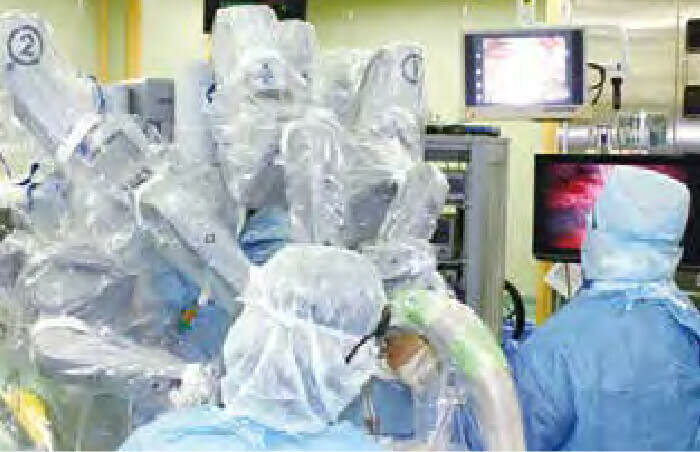
Our department deals with the urinary tract organs (kidney, ureter, bladder, and urethra), the adrenal glands, and the male genitals. The management of urogenital cancers, urinary problems, and renal insufficiency is increasingly important in our country, as increases in life expectancy are leading to an aging population. We provide comprehensive care from diagnosis to treatment, including medical, radiological, and surgical techniques. Our advanced surgical treatments include minimally invasive surgeries such as laparoscopic surgeries for operations ranging from cancer treatments to kidney transplantations, and the advanced "da Vinci" surgical robot system for the treatment of prostate and kidney cancers. Our department is one of the foremost institutions in Japan, with many years of experience of anticancer drugs, molecular targeted agents, and immuno-oncology drugs in cancer treatment We encourage collaboration with domestic and foreign institutions in the fields of clinical and basic research to create new evidence.
Department of Ophthalmology and Visual Sciences
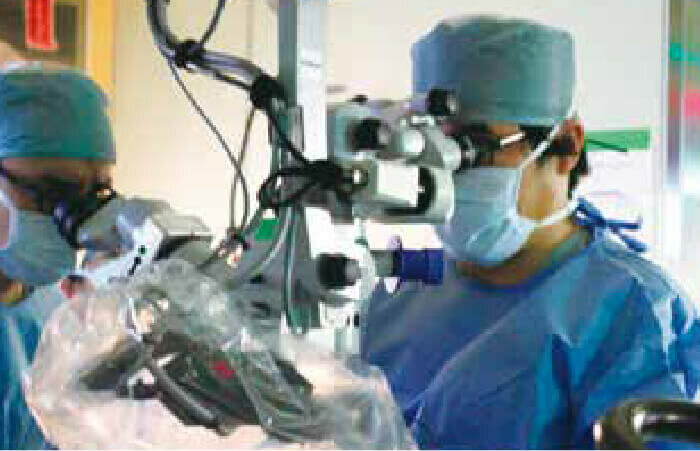
At our institution in the Yamagata Prefecture, we provide excellent medical care and treatment for all ophthalmic diseases, such as cataracts, glaucoma, vitreoretinal
diseases, tumors, strabismic amblyopia, and keratoconjunctival diseases. We have perlormed more than 1000 surgeries per year and are leading in Japan in the treatment
of severe proliferative vitreoretinal diseases and tumors. We are actively introducing further advancements in ophthalmic care, such as state-of-the-art three-dimensional
visualization of vitreoretinal diseases, steroid therapy for diabetic retinopathy and age-related macular degeneration, combined modality therapy with anti- vascular endothelial
growth factor, micro-incision vitrectomy surgery, selective laser trabeculoplasty for glaucoma, mitomycin treatment for conjunctival squamous cell carcinoma, and ocular
surface reconstruction surgery for keratoconjunctival diseases.
Additionally, our research includes areas, such as the development of new ophthalmic treatments, the molecular pathogenesis research of eye diseases, and participation in
molecular epidemiology research. We are pleased to present the results of our research in prestigious medical journals.
Department of Otolaryngology, Head and Neck Surgery
The Department of Otolaryngology, Head and Neck Surgery provides treatment of diverse diseases including ear diseases, neurologic ear diseases, nose paranasal sinus diseases, laryngopharynx diseases, tumors in the head and neck and in the thyroid. This department provides surgery medical care for ear, nose and throat, head and neck on the top level of Japan including artificial inner ear implantation operation for the person with severe hearing difficulties and head and neck cancer operations that needs reconstructive surgery, as the final and highest-order medical institution in Yamagata Prefecture. Furthermore, this department introduced examinations of hearing ability of infants that use the auditory routine reaction for the first time in Japan and achieved good results with the aim of early detection of aurally handicapped newborn babies and infants, in cooperation with local medical institutions and educational institutions. This department practices advanced medical science while keeping close cooperative relations with local medical institutions to contribute to the community medicine of Yamagata Prefecture. Furthermore, we are working positively to develop and improve minimally-invasive, safe, and reliable function preservation and function improvement treatment. For middle ear operation, in particular, we developed the minimally-invasive method of endoscopic operation for the first time in the world and have achieved good results. We are making daily efforts under the motto of "No Guts, No Glory" in pursuit of the latest medical care that can be said to be the top-class globally.
Department of Radiology(Division of Diagnostic Radiology, Radiation Oncology)
Department of Radiology specializes in radiation therapy and radiation diagnosis.
Division of Diagnostic Radiology uses diagnostic imaging and interventional radiology (IVR). It is our mission to diagnose quickly and precisely by using the latest imaging
technology such as CT and MRI, angiography, nuclear medicine and PET examination. IVR is a minimum invasive procedure by applying imaging techniques is indispensable
in management a patient in emergency and essential for treatment of a malignant tumor in particular. We obtain a dilatation of a stenotic vessel or embolization a
bleeding vessel or a tumor vessel with a needle or by inserting a catheter, while watching images.
In Division of Radiation Oncology, we are doing radiotherapy for cancer. Radiation therapy has recently made rapid progress as a treatment for cancer "cure without
surgery". The actual treatment is completed in a few minutes with no pain and no hot sensation and is a less invasive treatment method than surgery. Radiotherapy has
become able to obtain the same cure rate as surgery in many types of cancer. Heavy particle radiotherapy which will start in spring of 2020 is a type of radiotherapy. After
the completion of construction, we will be able to provide the world's best cancer treatment.
Department of Obsterics and Gynecology
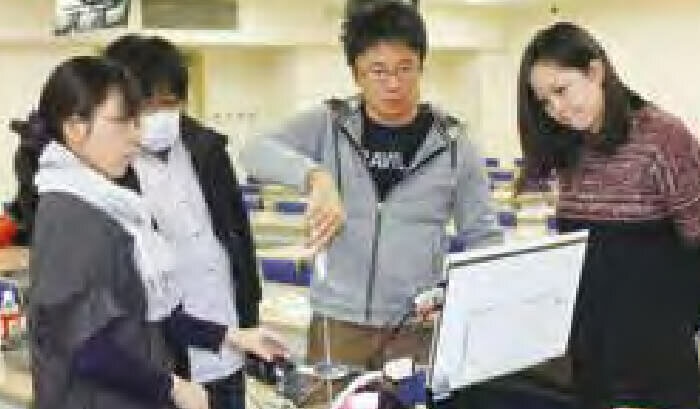
In our department, we are assigned to education, research and medical care of gynecological oncology, women's health, perinatal care and infertility. We need young power to enhance the field of obstetrics and gynecology. Therefore we set our high-priority issue on education. As for the student education, the lecture and supporting materials are updated every year to assimilate recent evidence, and we have brought in simulation education as experience-based learning. Sympathetic and respectful study guidance is our principle. Furthermore in postgraduate education, we have established the system to be able to obtain not only the qualification of the obstetrics and gynecology specialist but also subspecialties (oncology, women's health, perinatal medicine, reproductive medicine, laparoscopic surgery and medical genetics).
Department of Anesthesiology
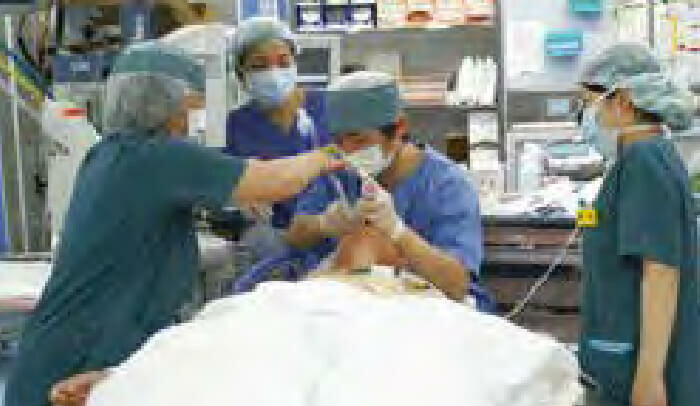
Our specialty is not only perioperative anesthesia, but also management of respiration, circulation and metabolism for the safety of patients during perioperative period. Also we work on intensive care medicine, emergency medicine, and pain clinic, and palliative care, etc .. We aim to acquire both knowledge and skills in clinical and research field about perioperative management and acute critical care medicine and pain management. We provide appropriate training programs to master anesthesiology for residents who wish to be competent anesthesiologists. We hope you find some interests in anesthesiology through joining us in your internship or clinical clerkship.
Department of Dentistry, Oral and Maxillofacial · Plastic and Reconstructive Surgery
Our department has an interesting characteristic that the members are constituted by oral surgeon and plastic surgeon. Oral and Plastic surgery has same concept of therapy. Our treatment goal is not only to cure but to provide the happiness life, that is, not only to resect the lesion but to reconstruct the desperate tissue defection surgically. Concretely, to provide the pleasure facial form, body, motility, pronunciation and mastication etc, are our missions. In particular, comprehensive treatment of cleft lip and palate is performed with the speech therapist and orthodontist. Our department works ideally in the point of that oral surgeon and plastic surgeon collaborate for the same aims with the same belief.
Department of Emergency & Critical Care Medicine
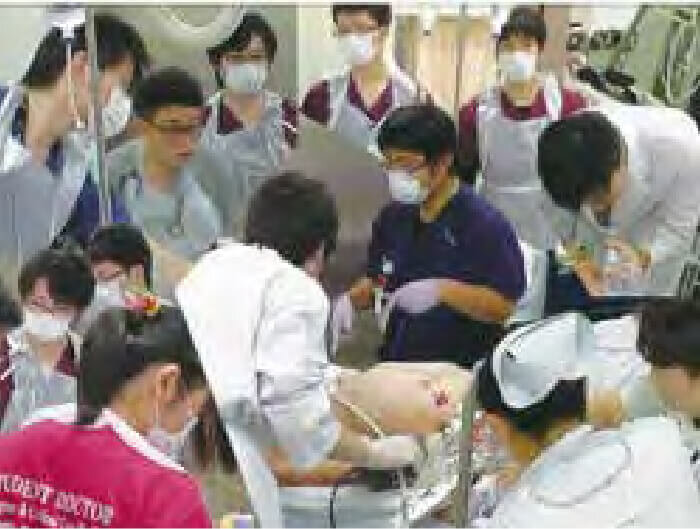
The Department of Emergency and Critical Care Medicine is dedicated to the education and training of our medical students including student doctors, and residents. Not only do we provide the highest quality emergency medicine, but our goal is to nurture "the best of the best", outstanding physicians who will mentor others, providing them with basic knowledge and training in triage trauma care and critical care. We collaborate with Emergency Care/Trauma Centers in Yamagata Prefecture and elsewhere that use physician-staffed helicopters, to provide training opportunities, taking on active roles in medical care, research, and education. Networking efforts within Yamagata are essential to resolving the shortage of physicians in the field, as we continue to contribute to progress in Advanced Emergency and Critical Care
Department of Regional Cancer Network
Medical devices have advanced rapidly in the fields such as particle therapy, high-precision radiotherapy, and robotically-assisted surgery. However, it is unrealistic choice that all hospitals own those expensive medical devices. Division of roles and improvement in quality of regional medical care are necessary. We have to construct a dynamic system with which patients can receive an appropriate care in an appropriate hospital. The problem is how hospitals share medical information. This department aims to improve the quality of medical care by utilizing IT network and Tohoku Cancer Network, the only one network for cancer care in Japan.
Department of Pathological Diagnostics [HP]
By utilizing morphological approach through a microscopic observation, the pathologists and cytologists not only practice to evaluate the etiology and pathogenesis of disease but also contribute to the clinical medicine on making a diagnosis of disease. [Teaching] Undergraduate students in both medical and nursing courses, postgraduate students and primary and advanced trainee doctors of the School of Medicine are taught about general pathology, systemic pathology (organ pathology), pathological diagnostics, scientific review articles and case study. [Research] The research activity of the department has been focused on the clinicopathological analysis and the role of dendritic cells, which are critical for evolving antigen-specific immunity, in human malignancies including hematolymphoid, gastrointestinal, endocrine and other cancers. [Pathological diagnosis and cytology] The candidates in advanced trainee doctors course have been training to be pathologist and cytology specialist To evaluate the cause of death, the specialists perform autopsy examination on the dead body with underlying unknown cause, and the failure or side effects of the treatment The tissue and cells from various lesion sections are collected and observed with a microscope to determine the name of disease (definite pathological diagnosis). Definite pathological and cytological diagnosis is essential for adequate therapy for each patient. Since May 2011 (Heisei 23), our section of pathological diagnostics for out-patients, which is the first among the national and public medical schools in Japan, has been opened. By consulting with the specialists, pathological diagnosis and cytology of their diseases have been informed to patients. In this way, pathological and cytological diagnosis provide the high-quality health care, as a part of clinical medicine.
Department of Pharmaceutical and Medical Device Regulatory Science
Although pharmaceuticals and medical devices have largely contributed to today's medical progress, there are many diseases for which effective treatment methods do not
yet exist Prompt development and approval of new pharmaceuticals is needed. Therefore, creation of innovative pharmaceuticals and resolution of medical drug lag are
recognized as urgent subjects in Japan and various measures are taken to solve them. At the same time, efforts are made to enhance safety measures to prevent recurrence
of drug induced suffering.
Under these circumstances, the Department of Pharmaceutical and Medical Device Regulatory Science analyzes and evaluates various data of the development, the review,
and post-marketing safety measures of pharmaceuticals and medical devices under cooperation with the Pharmaceuticals and Medical Devices Agency and, while publishing
the data as the basis for new countermeasures, fosters promising human resources who can play a central role in these fields.
Department of Medical Education
In the current medical education, not only traditional "-ology" based curriculum but also cross-curriculum learning are required. In addition, the model core curriculum showing the contents to be educated, includes something like "oriental medicine" which is not necessarily established as courses in medical schools . This department is in charge of coordination when education is conducted in cooperation of such multiple courses/ departments. In addition, improvement of the educational policy and construction of educational system including evaluation method are carried out mainly by the educational committee organized under faculty meeting and curriculum examination committee. However, recently, educational circumstances have largely changed, such as revision of the model core curriculum and introduction of evaluation by WFME global standards for quality improvement For example, outcome-based education and transition to educational program centered on the clinical clerkship are required in the medical education program. In order to respond to this situation, this department cooperates with the general medical education center in the university, and also conducts survey, analysis and recommendation on medical education for our students and graduates.
